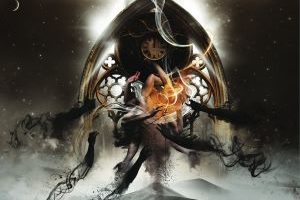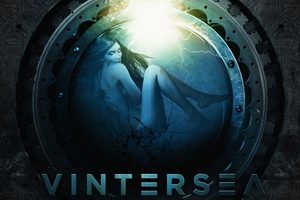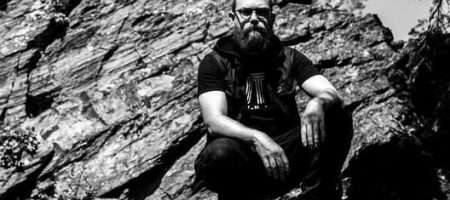Vintersea – Illuminating Gloom
Tuesday, 1st October 2019
One band that popped out in a big way two years back was Vintersea. Their full-length debut, The Gravity of Fall, took a number of metallic elements both brutal and melodic, and brought them together in a way that was exciting to listen to (not to mention intricate). They have returned now, with a label in tow, for their second album, Illuminated, and seem set to truly make their mark on the metal scene. With impressive musicianship that balances progressive melodies and technical prowess, to vocals that range from serene to savage, they’ve got the toolkit to impress early on in their career. We spoke with guitarist Riley Nix about everything from songwriting to growing Vintersea as a band, and what the next steps in their future might be.
Dead Rhetoric: What can you say about the early days of the band, and why the name switch up from Asterion to Vintersea?
Riley Nix: Basically, Jeremy [Spencer] and I have played music together since high school. We were in a previous band that fell apart, and wasn’t going to go forward, so we were looking towards what we would do next. We put out an ad on Craigslist in the summer of 2014 and right about then, both Avienne [Low] moved from Malesia to the US to go school and to find a metal band, and Jorma [Spaziano] moved to Oregon from the east coast, not even sure he was going to be in a band anymore. They both ended up responding to our ad based on a few early demos. We got together and started jamming out, and it felt like a really good fit right away. We started working on music and playing a few shows, and Asterion was our first attempt at that. We had a few songs that felt on the modern side of things, almost to a djent vibe, like The Contortionist and Human Abstract. Asterion was based on stars and constellations, so we were going for that modern prog thing.
But we figured out pretty quick that it wasn’t really what we wanted to do. We were being inspired by European black metal, atmospheric and post-metal, it was a big mix of progressive and melodic metal types. So we decided to delve headfirst into that and develop our own sound. Then we changed our name to Vintersea. “Vinter” being winter and “sea” because we are from the Pacific Northwest. Grey ocean waves are a heavy asthetic and we decided to go with that.
Dead Rhetoric: What lessons did you take from The Gravity of Fall and Asterion’s Constellations?
Nix: The Constellations EP came together pretty quick. It was just our first attempt to get some music together. The Gravity of Fall was where we were able to really figure out what our sound was. We spent a lot of time producing it and writing it. We spent a lot of time in the band room and put a lot of effort into making it as good as we could. But we were doing a lot of experimenting still. We were trying to figure out what our sound was going to be moving forward. It wasn’t until the end of the mastering process that it really became clear what our sound was. Once we started putting in a lot of the big orchestrations and big, vocal harmony layering, and working out the minutia of the details.
When we released the album, those were the songs that got the best response by far. We realized that it was unique and interesting, and what we should pursue. So when we started writing Illuminated, we had a much clearer idea in our head of where we were going. We still did a lot of experiments and new stuff, but we kind of knew that we were going for a big, orchestrated sound with tons of layering. It really did direct the way that we wrote more specifically.
Dead Rhetoric: How does Illuminated showcase your growth as a band?
Nix: It’s kind of the same thing. We had a more direct and clear vision of how we wanted the album to sound from the beginning. With The Gravity of Fall, we put our best songs forward at the time and found a way to make them all sounded like they belonged on the same record. With Illuminated, we did it with purpose. That’s one of the places that showed our growth the most. We could get technical about it and say that Jeremy got a lot better at blast beats – he was really prepared for this record. We wrote more intricate riffing and things like that, but really it came down to having a clear vision from the beginning and executing it through a lot of hard work. There were a lot of re-writes and cancelling things that didn’t work but I think it paid off.
Dead Rhetoric: What do you feel helps you to stand out as a band? I like that fact that when I describe Vintersea, I can’t really come up with an “It sounds like X, Y, and Z” for band comparisons.
Nix: I hope that’s what it is actually. I think each member of the band brings forth pretty diverse influences and I think we’ve found a way to incorporate all of those things. Avienne is really excited about vocalists that do a lot of intricate layering and harmonizing, and that’s great but I haven’t really seen a lot of bands that do that with the massive, black metal orchestrations that Dimmu Borgir do. I think that by bringing these things together, and this is what has always been our goal, is to make the music that we want to hear. Things that we aren’t hearing in the public sphere yet, so I hope that’s what makes us stand out. We are taking really diverse, almost disparate influences and bringing them together into something that’s pretty unique.
Dead Rhetoric: What’s most important when it comes to writing and putting songs together for the band? What’s the piece that holds it together?
Nix: I think it depends a little bit on the song. We have written some songs that are really guitar-focused, so that it’s all about the riff. I’m a guitar player, so that’s easy for me to say [laughs]. But there are absolutely songs on this record, that would not have made the record, if it wasn’t for the vocal line. Or they didn’t come together until the drums were brought in. Or they sounded empty until the orchestrations came in. So in some ways, I don’t think we have a single answer to that question. I think a lot of times it is the interplay between the instruments. We sometimes modify things, like the orchestrations, because the vocal lines are already covering them. The important piece is the conductor of the whole thing. We aren’t playing the instruments we are playing the orchestra, if that makes sense. So by having that insight of knowing what the vocals, guitar, and drums do, and knowing what happens when they are together, I think that is what’s most important for us.
Dead Rhetoric: What musical inspirations do you take from being in the Pacific Northwest?
Nix: A lot for sure. Especially early on when we were figuring out what band we were going to be. Our first photo shoot that we did was on a cloudy, rainy day on the ocean and I think that kind of shows what our mindset was. Our music tends to be about human characters struggling against some sort of overwhelming odds. There’s nothing that better shows that struggle than something that you can’t control at all – the weather, or the natural order of things. You also just can’t help it when you wake up from September to May and it’s grey and cloudy. It doesn’t get much more heavy than that [laughs].
Dead Rhetoric: How did you hook up with M-Theory Audio?
Nix: We’ve been totally self-released, self-managed, and everything for a long time. We played a show about two years ago with a band called Graveshadow, out of Sacramento, California. A great, female-fronted symphonic heavy metal band. We hit it off with them really well and became really good friends with several of their members. They are on M-Theory Audio. They had just released their second album with them. They recommended to the head of the label, Marco Barbieri, to check us out. It was a year or year and a half of showing him what we were up to. When it came just about time for our first single to come out, we struck a deal.
We had talked for a while, so we knew what the details would be. They really help out a lot on the distribution side. A big problem for us has always been that our music is much more popular in Europe than it is in the United States. It costs a lot to ship to Europe from Oregon. We didn’t feel like we could serve our fans in Europe very well. With this partnership with M-Theory, they have distribution set up all over the world, and we are pretty excited to get our music over to those people.
Dead Rhetoric: You’ve done some impressive music videos to accompany your music. Do you feel you need to make just as much of an impact here to grow the band?
Nix: That was the decision that we made, yeah. We are also fairly visual people, in addition to being musical people. It’s all about the whole package. We put a lot of time and effort into the music, but if we don’t present it in a way that people are actually going to hear it, then it’s a lot of work that doesn’t pay off. We actually hooked up with Karl Whinnery, he does music videos. He owns a production company that actually does videos for bands in the Portland area. He actually did our first video for “Skies Set Ablaze” from The Gravity of Fall and ended up becoming our bass player. We hit it off really well and spent some time with him as we worked on the video – then 6-8 months later we invited him on to play bass. He’s been a bass player in the Portland area for a long time. He’s played in bands like Proven, who toured nationally and everything. He was really excited to join. Having him is a huge asset. He pretty much takes the lead on all of our video work, and has taken us to places we wouldn’t have gotten if not for the visuals of the music videos.
Dead Rhetoric: What have you found to be challenges that you have had to face as a band and become more successful?
Nix: The biggest challenge is what everyone is facing. It’s great that we aren’t relying on these big music labels to tell us what to listen to, but the negative side is that there’s a lot of static. There’s a ton of bands out there now, and a lot of them are making great music. I’m glad that we have so much great music to listen to. But it does make it hard when you are one of those bands that have to cut through the noise. I think the music videos have been a good asset for us. We’ve done a good job of trying to be professional and present ourselves as one of the bands to go to that people need to keep an eye on. Trying to balance the press side of things, with artistic integrity, is always a challenge. But it’s one that we enjoy tackling. We are all competitive people and are excited about our music. We look forward to making people listen to us [laughs].
Dead Rhetoric: It’s funny that you mention the artistic integrity, as I was thinking that there’s no real push, on your end at least, tossing you all into the ‘female-fronted’ grouping, which I thought was refreshing to see.
Nix: It’s definitely a balance to strike. When people see Avienne and then see what she can do, they are pretty shocked. We want to capitalize on that and show people what she can do. At the same time, we aren’t reliant on that – we have a lot of things going on. Avienne has also been pretty clear that she wants to be a great metal vocalist, not ‘great for a female’ metal vocalist. All of her influences are male vocalists, so it’s definitely a balancing act of showing people what she can do, and letting them be impressed but also just trying to put out great music, regardless of whether it was her or not.
Dead Rhetoric: What are your goals and aspirations for Vintersea?
Nix: I would say that the first goal is that we are really excited to get to Europe and get to touring. We have a lot of fans in Europe, and most of us haven’t even been over there before. We get a lot of requests to get over there and play shows. I’m hoping that within the next year, we can hop on a leg of a tour or go over for part of festival season. That’s one of our top goals for sure. Other than that, we want to promote this album as well and do some regional touring. We are pretty excited about this album. We think it shows the best material we’ve done to date, and we want to make sure it gets out there and does really well, giving the label something to push us on and send us around the world.
Dead Rhetoric: What’s next for Vintersea?
Nix: We have an album release show in Portland on October 4th. We will play the album in its entirety at Twilight Bar in Portland, Oregon. Then on November 2nd, we are opening for Jinjer and The Browning in Portland. That show has been sold out for months, so we are looking forward to it. We will also have another music video to come out as well. We don’t have anything else booked yet, but we have been asked to keep next year pretty open so that we can hopefully do some decent touring.


























